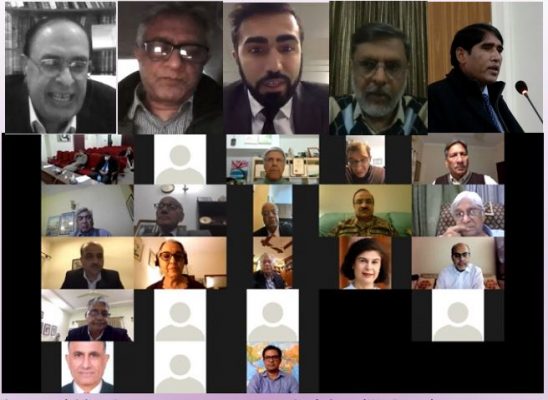Lessons and Opportunities for COVID-19 Research and Development in Pakistan – A Virtual Round Table February 4, 2021

COVID-19 has changed perceptions and the ways we live our lives. It has put a burden on health care systems and hence we need to strengthen our systems without being dependent on other countries. In this pandemic, economies halted; business suffered, and a lot happened. This was the first year and also the first such major test in Pakistan’s history of objectively evaluating what the lessons are, not only for implementation, clinical care, response, but with a focus on what are the gaps and opportunities in the research and development pathway that Pakistan adopted. A lot of efforts were made by the Government especially in the area of providing reliable testing facilities across the country, implementation of smart lockdowns, contact tracings, the establishment of the National Institute of Virology in Sindh, investment in manufacturing ventilators locally, and strengthening of public and private healthcare facilities. The private sector also worked hand in hand with the Government and supported the healthcare
systems in the available limited resources. Media outlets were also very responsive and responsible for ensuring prompt sharing of data and providing firsthand information to the public.
In this regard, Pakistan Academy of Sciences (PAS) and the Aga Khan University, Karachi jointly organized this Virtual Round Table with the explicit aimed to deliberate and focused on reviewing what we have learnt to date in the COVID-19 response in Pakistan and its implications for what needs to be done to strengthening research and development in major gap areas.
The Speakers were Prof. Dr Khalid Mahmood Khan (President PAS), Prof. Dr. Zulfiqar A Bhutta (Founding Director, Institute for Global Health and Development, The Aga Khan University, Karachi), Hon. Dr Faisal Sultan (Special Assistant to the Prime Minister for Health, Government of Pakistan) Hon. Prof. Dr. Atta ur Rehman (Chairman of the Prime Minister of Pakistan’s Task Force on Science & Technology), Prof. Dr Assad Hafeez (Vice Chancellor, Health Services Academy, Islamabad), Maj. Gen. Aamer Ikram, (Executive Director, National Institute of Health,
Islamabad), Dr. Zahra Hasan (Professor, Pathology and Laboratory Medicine, The Aga Khan University, Karachi), Dr. Zain ul Abedin (Director Research & Development Higher Education Commission, Islamabad, Pakistan), and Prof. Dr. Tasawar Hayat (Secretary General, PAS). Few Fellows also participated in the Round Table discussion.
The agenda of the round table was divided into specific areas, such as knowledge of epidemiology and burden, ability to diagnose, characterize and manage, and important time for participants to think tanks to see what is needed from a natural perspective.
Government’s Science Response
Besides the immediate and much needed response from the Health Department, the Government’s Science Division was equally prompt in taking initiatives to address this global pandemic.
The Science Division augmented the national initiatives of expanding testing facilities (through a grant from the British Government) and undertaking various clinical trials, specially to ascertain the changing strain of the corona virus, which is now the recent most challenge. It is believed that the available vaccines will have moderate effect on the mutating virus as the extent of efficacies is still unknown. To get a clearer picture we need to further expand the testing facilities, across the nation; and to be better positioned to fight, we need to develop indigenous facilities of vaccine development. This will not increase decrease the projected financial burden of vaccinating the masses, but also will encourage national manufacturers into developing the required infrastructures.
Conclusion and Way Forward
It is imperative that Pakistan must strengthen its national capacities not only for surveillance but also for monitoring. This can be achieved through a concerted effort and development of a national strategy and an action plan whereby there is active collaboration amongst the public, private, researchers, and academia. It is also important to provide universities and colleges with supportive research opportunities so that research advancement can happen in the Country especially in the area of STEM education. Pakistan does need investments in indigenous vaccines development with an equal focus on biotechnology to safeguard its national security. The roles of national oversight bodies need to be relooked for the Country to be better positioned to support and be prepared for any such pandemic in the future. The Pakistan Academy of Sciences can play an important role in helping bridge the science to policy chasm and act as a platform for honest and transparent debate on the subject. A major next step would also relate to pandemic planning and this workshop could serve as a stepping stone for that planning process.
